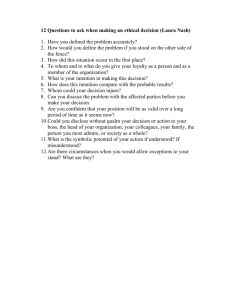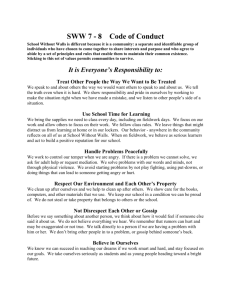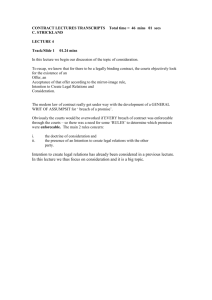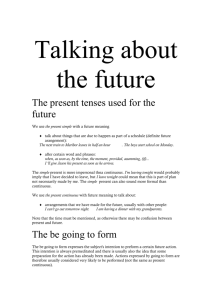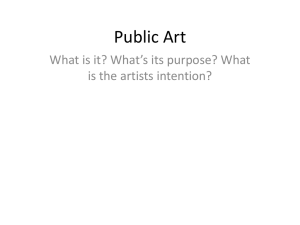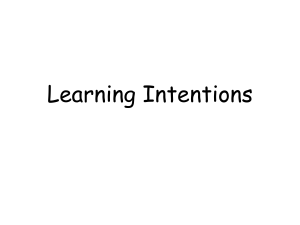Excerpts from Tricylce Teachings – Right Speech - IMC-L
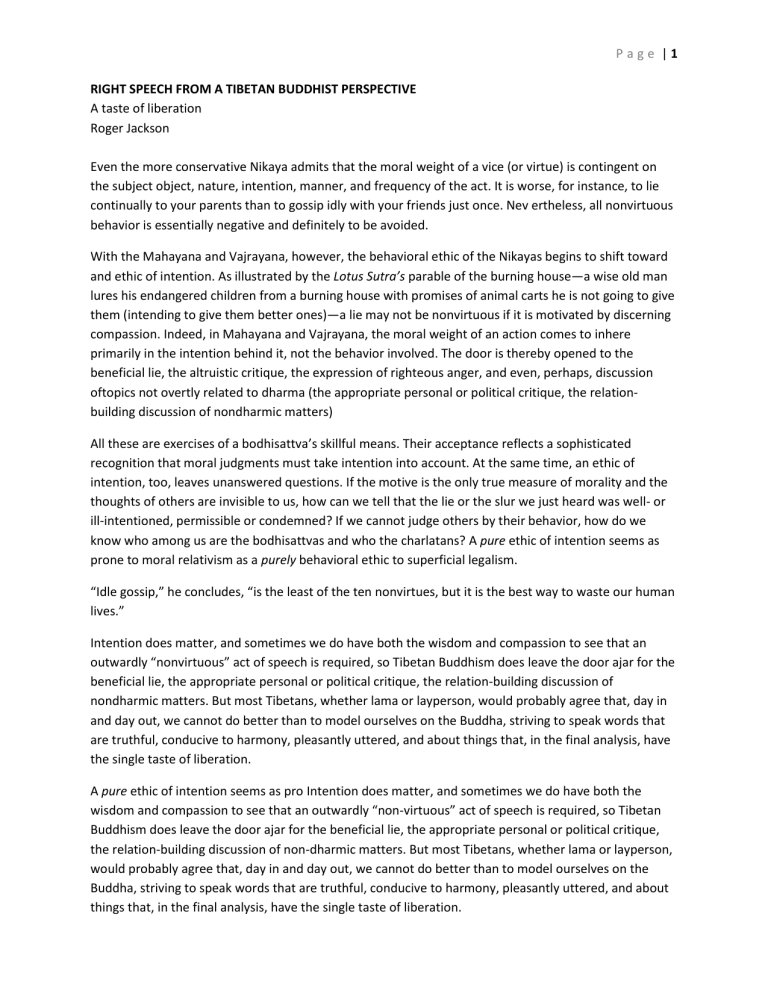
P a g e | 1
RIGHT SPEECH FROM A TIBETAN BUDDHIST PERSPECTIVE
A taste of liberation
Roger Jackson
Even the more conservative Nikaya admits that the moral weight of a vice (or virtue) is contingent on the subject object, nature, intention, manner, and frequency of the act. It is worse, for instance, to lie continually to your parents than to gossip idly with your friends just once. Nev ertheless, all nonvirtuous behavior is essentially negative and definitely to be avoided.
With the Mahayana and Vajrayana, however, the behavioral ethic of the Nikayas begins to shift toward and ethic of intention. As illustrated by the Lotus Sutra’s parable of the burning house—a wise old man lures his endangered children from a burning house with promises of animal carts he is not going to give them (intending to give them better ones)—a lie may not be nonvirtuous if it is motivated by discerning compassion. Indeed, in Mahayana and Vajrayana, the moral weight of an action comes to inhere primarily in the intention behind it, not the behavior involved. The door is thereby opened to the beneficial lie, the altruistic critique, the expression of righteous anger, and even, perhaps, discussion oftopics not overtly related to dharma (the appropriate personal or political critique, the relationbuilding discussion of nondharmic matters)
All these are exercises of a bodhisattva’s skillful means. Their acceptance reflects a sophisticated recognition that moral judgments must take intention into account. At the same time, an ethic of intention, too, leaves unanswered questions. If the motive is the only true measure of morality and the thoughts of others are invisible to us, how can we tell that the lie or the slur we just heard was well- or ill-intentioned, permissible or condemned? If we cannot judge others by their behavior, how do we know who among us are the bodhisattvas and who the charlatans? A pure ethic of intention seems as prone to moral relativism as a purely behavioral ethic to superficial legalism.
“Idle gossip,” he concludes, “is the least of the ten nonvirtues, but it is the best way to waste our human lives.”
Intention does matter, and sometimes we do have both the wisdom and compassion to see that an outwardly “nonvirtuous” act of speech is required, so Tibetan Buddhism does leave the door ajar for the beneficial lie, the appropriate personal or political critique, the relation-building discussion of nondharmic matters. But most Tibetans, whether lama or layperson, would probably agree that, day in and day out, we cannot do better than to model ourselves on the Buddha, striving to speak words that are truthful, conducive to harmony, pleasantly uttered, and about things that, in the final analysis, have the single taste of liberation.
A pure ethic of intention seems as pro Intention does matter, and sometimes we do have both the wisdom and compassion to see that an outwardly “non-virtuous” act of speech is required, so Tibetan
Buddhism does leave the door ajar for the beneficial lie, the appropriate personal or political critique, the relation-building discussion of non-dharmic matters. But most Tibetans, whether lama or layperson, would probably agree that, day in and day out, we cannot do better than to model ourselves on the
Buddha, striving to speak words that are truthful, conducive to harmony, pleasantly uttered, and about things that, in the final analysis, have the single taste of liberation.
P a g e | 2
RIGHT SPEECH IN MARRIAGE
Susan Piver Browne
I love the concept of idiot compassion. Just as being truly compassionate doesn’t mean always being sweet and nice (sometimes it means being cold, harsh), being truly honest doesn’t mean speaking your thoughts and feelings as they arise. Other awarenesses and intention must be at work—and a recognition that the truth is not solid.
Avoid Abusive Words
I’ve known people who hurl epithets and use insults and aggression to make a point, to clear space, to be heard. My family didn’t do that. It’s easy for me not to do those things with my husband, no matter how provoked. What my family did do—and what it’s hard for me not to do— was create abusive silence. There is the silence of refraining from saying something hurtful out of a sense of gentleness. And there is the silence of fuck you. Is this abusive speech? I think so.
Avoid Idle Chatter, Slander
I immediately think of jealous territoriality, of clearing space around oneself as a way of preventing the closeness of others who may threaten the couple—very female.
This quiet creation of one viewpoint of people and events must be approached with great care and without the intention of dividing the beloved from his own thoughts, his own approach, out of fear.
When I am compelled to gossip, I try to prevent myself. It is hardest of all with my husband. I want the moronic pleasure of maliciousness and high-toned judgment of others, with the one who holds me in the highest regard. The S&M of ego.
In the end, for me, it boils down to something a wonderful friend once told me: If the intention is good, then it doesn’t matter if the result manifests in the heaven or hell realm.
RIGHT LYING
Can a lie be right speech?
Lin Jensen
It In the Chinese and Japanese languages, however, the character for “heart” is the same as the one for
“mind.” … It is within this inclusive wholeness that the Zen ethic of right speech resides. To speak truly, one must engage with, and depend upon, the accidental and unforeseen circumstances of the living moment. No outside guide will suffice. The best we can do is show up for the event, heart and mind.
While there have been times when I’ve lied and deeply regretted it, there have also been times when
I’ve just as deeply regretted telling the truth.
P a g e | 3
THE TRUTH ABOUT GOSSIP
If you don’t have anything nice to say…
Bhikshuni Thubten Chodron
On first hearing, the above examples may seem a bit crude. “Who, me? I wouldn’t speak like that!” ego innocently purrs. Or if we do recognize those negative habits of speech, our mind says, “That’s because everyone else talks like that.” But if we look inside ourselves with the searchlight of a sincere wish to become a better person for our own and others’ benefit, we will locate our own less-than-likeable motivations. When have we had those motivations? When have we gossiped about others? Initially, this kind of internal research may be extremely uncomfortable. After all, who likes to admit their faults? It’s much more interesting to address others’ defects. But that is precisely the point: what is it we’re avoiding by looking outward instead of inward? What are we achieving by holding up a magnifying glass instead of looking in a mirror? By ignoring, rationalizing, denying, and justifying our nasty motivations and unkind behavior we feel worse in the long run, not better. A tremendous sense of relief comes when we can be honest about what we’re thinking, feeling, saying, and doing. We take responsibility for our actions without feeling guilty about them because we don’t attach a big-ego “I” to them as in “I’m such a bad gossip.” By admitting our mistakes without exaggerating them, we’ll begin to clean them up.
We’ll feel better about ourselves; and because our behavior toward others will change, their responses to us will transform as well.
How do we begin to notice these motivations? This is where daily meditation practice is essential. Some quiet time alone each day to review our thoughts, feelings, words, and deeds is essential for a healthy lifestyle. For example, when we wake up, we generate our motivation for the day: “Today, as much as possible, I won’t harm anyone verbally or physically or even with my thoughts. As much as possible, I will help others in whatever big or small way presents itself. And I’ll keep the long-term motivation of becoming enlightened for the benefit of all beings in my heart.” Starting the day with a conscious intention like this transforms all our interactions during the day. In the evening, we again sit quietly and evaluate our day: “How did living according to my motivation go?” When we see shortcomings, we apply one of the Buddha’s teachings to transform our motivations and actions. We rejoice at the thoughts, words, and deeds that kept true to our morning motivation.
… destabilize the harmony of the group.
Sometimes we find ourselves on the other side of this situation: we’re really upset with someone and need to discuss it. So we approach a close friend and explain, “Something just happened between me and Sally. I’m angry and need some help dealing with it. Can you listen and help me?” In other words, we make it clear to ourselves and to our friend that we want to talk about ourselves, not bad-mouth
Sally. By taking on our own anger, we avoid gossip. We also don’t put our friend in the uncomfortable position of having to side with us in order to maintain the friendship. Our friend can listen and reflect back to us what we’re feeling, which helps us to calm our mind. Or, if we’re open, she may even be able to help us look at our own part in the incident. In this way, our friend becomes a true friend, someone who helps us live ethically.
P a g e | 4
Seven Tips for Giving Up Gossip
1. Recognize that gossip doesn’t undo the situation you’re talking about. It only puts in motion another situation based on negative feelings.
2. Know that comparing yourself to others is useless. Everyone has his or her own talents. In this way, give up jealousy and the wish to put others down.
3. Be aware of and transform your own thoughts, words, and deeds rather than commenting on those of others.
4. Train your mind to see others’ positive qualities and discuss them. This will make you much happier than gossiping ever could.
5. Forgive, knowing that people do harmful things because they are unhappy. If you don’t make someone into an enemy, you won’t want to gossip about him.
6. Have a sense of humor about what you think, say, and do, and be able to laugh at all of the silly things we sentient beings carry out in our attempt to be happy. If you see the humor in our human predicament, you’ll be more patient.
7. Practice saying something kind to someone every day. Do this especially with people you don’t like. It gets easier with practice and bears surprisingly good results.
Bhikshuni Thubten Chodron is a student of H.H. the Dalai Lama and founder of Sravasti Abbey in
Washington State. She is the author of Cultivating a Compassionate Heart.
